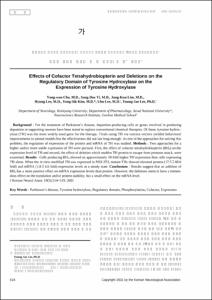Tetrahydrobiopterin과 Tyrosine Hydroxylase 조절부위의 인위적 변이가 Tyrosine Hydroxylase의 발현에 미치는 영향
- Keimyung Author(s)
- Cho, Yong Won; Yi, Sang Do; Lim, Jeong Geun; Lee, Hyung
- Department
- Dept. of Neurology (신경과학)
- Journal Title
- 대한신경과학회지
- Issued Date
- 2001
- Volume
- 19
- Issue
- 5
- Abstract
- Background : For the treatment of Parkinson’s disease, dopamine-producing cells or genes involved in producing dopamine or supporting neurons have been tested to replace conventional chemical therapies. Of these, tyrosine hydroxylase(TH) was the most widely used gene for the therapy. Trials using TH via various vectors yielded behavioral improvements in animal models but the effectiveness did not last long enough. As one of the approaches for solving this problem, the regulation of expression of the protein and mRNA of TH was studied. Methods : Two approaches for a higher and/or more stable expression of TH were pursued. First, the effect of cofactor tetrahydrobiopterin (BH4) on the expression level of TH and second, the effect of deletion which enables TH protein to escape from protease attack, were examined. Results : Cells producing BH4 showed an approximately 10-fold higher TH expression than cells expressing TH alone. When the in vitro modified TH was expressed in NIH-3T3, mutant THs showed elevated protein (17.5~68.6 fold) and mRNA (1.8~4.6 fold) expression levels at a steady state. Conclusions : Results suggest that an addition of BH4 has a more positive effect on mRNA expression levels than protein. However, the deletions seem to have a tremendous effect on the translation and/or protein stability, but a small effect on the mRNA level.
- Alternative Title
- Effects of Cofactor Tetrahydrobiopterin and Deletions on the Regulatory Domain of Tyrosine Hydroxylase on the Expression of Tyrosine Hydroxylase
- Publisher
- School of Medicine
- Citation
- 조용원 et al. (2001). Tetrahydrobiopterin과 Tyrosine Hydroxylase 조절부위의 인위적 변이가 Tyrosine Hydroxylase의 발현에 미치는 영향. 대한신경과학회지, 19(5), 514–519.
- Type
- Article
- ISSN
- 1225-7044
- Appears in Collections:
- 1. School of Medicine (의과대학) > Dept. of Neurology (신경과학)
- 파일 목록
-
-
Download
 oak-bbb-1961.pdf
기타 데이터 / 57.46 kB / Adobe PDF
oak-bbb-1961.pdf
기타 데이터 / 57.46 kB / Adobe PDF
-
Items in Repository are protected by copyright, with all rights reserved, unless otherwise indicated.